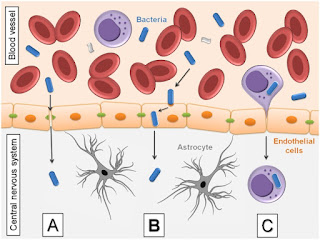Rickettsia is typically vector-borne, transmitted by ticks, body lice, mites, and fleas. Rickettsia preferentially infects the vascular endothelial cells lining the small and medium vessels throughout the body, causing the systemic symptoms and high mortality seen with these infections. The infection of endothelial cells leads to disseminated inflammation, loss of barrier function, and altered vascular permeability throughout the body.[Jessica Snowden;]
Rickettsial infections can affect many organs, including the central nervous system (CNS). The most common neurological manifestations reported in rickettsial infections include meningitis, encephalitis, and acute disseminated encephalomyelitis. However, unilateral facial nerve palsy, cerebral infarction, or visual loss have also been diagnosed.Rickettsial neuroinvasion occurs during the systemic phase of the disease and typically follows bacterial dissemination via the bloodstream. As other intracellular microorganisms, rickettsiae might use a transcellular approach, which is supported by the fact that bacterial replication takes place within endothelial cells.[Zuzana Sekeyová;]
The clinical features of rickettsial diseases can often overlap with other tick-borne diseases, particularly with borrelioses. These organisms can share the same transmitting vector; co-infection in a single vector is possible, leading to further complication of the diagnosis and treatment of these diseases.[E. Zghenti;]
Rickettsioses share common clinical manifestations, such as fever, malaise, exanthema, the presence or absence of an inoculation eschar, and lymphadenopathy. Some of these manifestations can be suggestive of certain species of Rickettsia infection. Nevertheless none of these manifestations are pathognomonic, and direct diagnostic methods to confirm the involved species are always required.[Álvaro A.Faccini-Martínez;]
Some clinical manifestations of rickettsiosis:
To detect Rickettsia infections we propose the new Phage Rickettsia test which detects a broad range of Rickettsias: Rickettsia japonica (multiple strains); Rickettsia heilongjiangensis (multiple strains); Rickettsia parkeri (multiple strains); Rickettsia raoultii (multiple strains); Rickettsia rickettsia (multiple strains); Rickettsia slovaca (multiple strains); Rickettsia montanensis; Rickettsia peacocki; Rickettsia africae; Rickettsia conorii.







